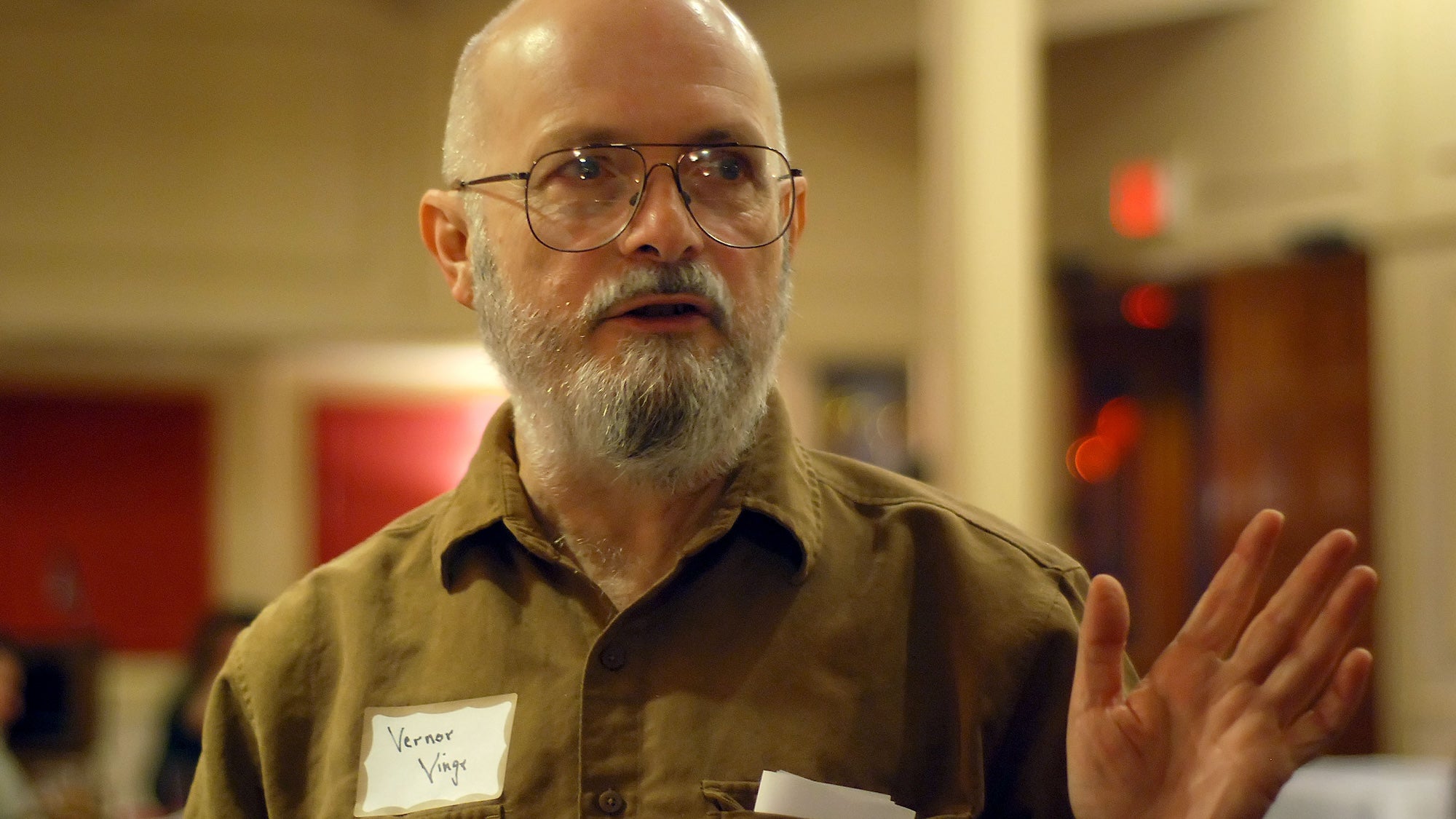Vernor Vinge, influential sci-fi author who warned of AI ‘Singularity,’ has died
Vernor Vinge, prolific science-fiction writer, professor, and one of the first prominent thinkers to conceptualize the concepts of a “Technological Singularity” and cyberspace, has died at the age of 79. News of his passing on March 20 was confirmed through a Facebook post from author and friend David Brin, citing complications from Parkinson’s Disease.
“Vernor enthralled millions with tales of plausible tomorrows, made all the more vivid by his polymath masteries of language, drama, characters, and the implications of science,” Brin writes.
The Hugo Award-winning author of sci-classics like A Fire Upon the Deep and Rainbow’s End, Vinge also taught mathematics and computer science at San Diego State University before retiring in 2000 to focus on his writing. In his famous 1983 op-ed, Vinge adapted the physics concept of a “singularity” to describe the moment in humanity’s technological progress marking “an intellectual transition as impenetrable as the knotted space-time at the center of a black hole” when “the world will pass far beyond our understanding.” The Singularity, Vinge hypothesized, would likely stem from the creation of artificial intelligence systems that surpassed humanity’s evolutionary capabilities. How life on Earth progressed from there was anyone’s guess—something plenty of Vinge-inspired writers have since attempted.
[Related: What happens if AI grows smarter than humans? The answer worries scientists.]
John Scalzi, bestselling sci-fi author of the Old Man’s War series, wrote in a blog post on Thursday that Vinge’s singularity theory in now so ubiquitous within science fiction and the tech industry that “it doesn’t feel like it has a progenitor, and that it just existed ambiently.”
“That’s a hell of a thing to have contributed to the world,” he continued.
In many ways, Vinge’s visions have arguably borne out almost to the exact year, as evidenced by the recent, rapid advances within an AI industry whose leaders are openly indebted to his work. In a 1993 essay further expounding on the Singularity concept, Vinge predicted that, “Within thirty years, we will have the technological means to create superhuman intelligence,” likening the moment to the “rise of human life on Earth.”
“Shortly after, the human era will be ended,” Vinge dramatically hypothesized at the time.
Many critics have since (often convincingly) argued that creating a true artificial general intelligence still remains out-of-reach, if not completely impossible. Even then, however, Vinge appeared perfectly capable of envisioning a dizzying, non-Singularity future—humanity may never square off against sentient AI, but it’s certainly already contending with “a glut of technical riches never properly absorbed.”
Please Support Our Sponsors
Solar Power Generator Discounts Along With Free Shipping
- 10% OFF for Jackery Solar Generator 2000 Pro Series with code "JADEAL"
- 10% OFF for Jackery SolarSaga 200W Solar Panel with code "JADEAL"
- 10% OFF for Jackery Solar Generator 1500 Series with code "JADEAL"
- 10% OFF for Jackery Solar Generator 1000 Series with code "JADEAL"
- 10% OFF for Jackery Explorer 1500 Portable Power Station with code "JADEAL"
- 10% OFF for Jackery Explorer 1000 Pro Portable Power Station with code "JADEAL"
- 10% OFF for Jackery Explorer 500 Pro Portable Power Station with code "JADEAL"
- 10% OFF for Jackery Explorer 300 Pro Portable Power Station with code "JADEAL"
- 10% OFF for Jackery SolarSaga 100W Solar Panel with code "JADEAL"

The University of Georgia is represented by the Georgia Bulldogs . The Bulldogs participate in the Southeastern Conference's (SEC) Eastern Division of the NCAA.
They play their home games in the storied Sanford Stadium in Athens, Georgia. The first season in Georgia was in 1892. In 1942, 1980, and 2021, the Georgia Bulldogs won three national championships.
The Georgia Bulldogs have additionally been crowned the National Champion in four additional seasons by at least one polling organization (1920, 1927, 1946 and 1968).
The Georgia Bulldogs are tied for second place in conference history with their 15 conference titles, including 13 SEC titles, and their 59 bowl appearances, which ranks second all-time.
In addition, the program has produced five top picks in the National Football League (NFL) draft, two Heisman Trophy winners, numerous winners of various national honors, and many others.

Longhorns football represents the University of Texas in Austin often known as Texas, UT or the Texas Longhorns. The Longhorns represent the Big 12 Conference in the NCAA Division. They play in Austin, Texas, at the Darrell K. Royal-Texas Memorial Stadium.
The Texas Longhorns are ranked third and seventh, respectively, in terms of all-time wins and win-loss records, with over 900 victories and an overall win-loss percentage of.705.
The legendary program also boasts four national titles, 32 conference titles, 100 First Team All-Americans, and two Heisman Trophy winners.
Get your Texas Longhorns Revival T-Shirt today. The Texas Longhorns Rustic Revival shirt is also a fan favorite.
Many college sports fans like to wear their gear all around town, get your Texas Longhorns Centered gear and show your support.





 Gettr
Gettr














